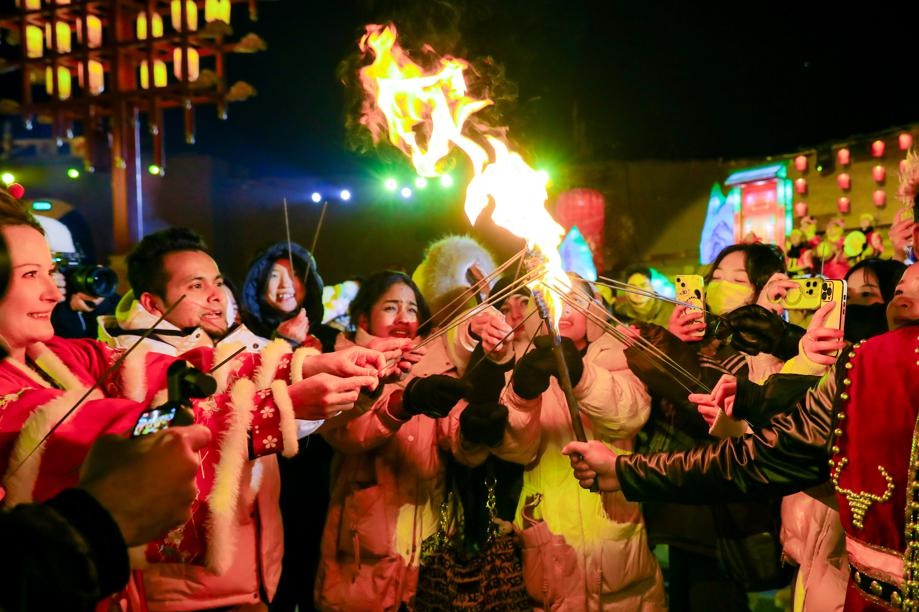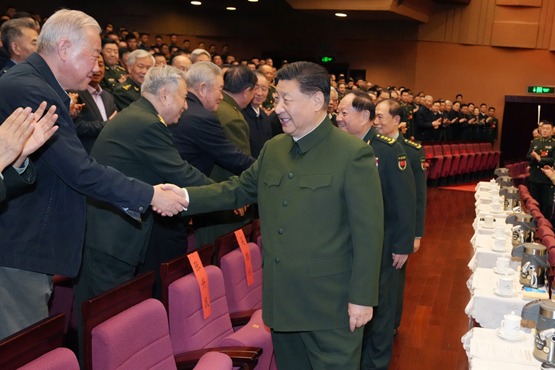Interview with Xinjiang government chief on counterterrorism, vocational education and training


Xinhua News Agency published an interview with Shohrat Zakir, chairman of the Xinjiang Uygur autonomous region, on Tuesday about counterterrorism and the region's vocational education and training program. The following is the full transcript of the interview:
Would you please brief us on the current situation in Xinjiang, given that under the influence of international terrorism and religious extremism the number of violent terrorist attacks had been on the rise in parts of the region over a period of time?
Since the 1990s, the "three evil forces" (terrorism, extremism and separatism) in China and abroad have plotted, organized and conducted thousands of violent terrorist attacks including bombings, assassinations, poisoning, arson, assaults, unrest and riots, causing the deaths of a large number of innocent people and hundreds of police officers, as well as immeasurable property damage. The horrific crimes of terrorists not only severely undermined the stable and peaceful order and the atmosphere of solidarity and progress of Xinjiang but also trampled on the essential human rights of people of all ethnic groups in the region, such as their rights to life, health, property and development. People of all ethnic groups in Xinjiang were enraged and shared hatred toward the terrorist crimes. A child of a Uygur police officer who died in the line of duty wrote me a letter. In emotional words, the letter reads: "My father sacrificed his life on the counterterrorism front line. His upright personality will always inspire me. I hope that the Party and government can unwaveringly root out terrorism so that no child grows up without their father."
Facing complex and grave circumstances as well as the pressing anti-terrorism desire of the people, the Chinese government has resolutely taken measures in preventing and combating violent terrorist crimes in accordance with the law. In the past few years, under the firm leadership of the Communist Party of China Central Committee, with Comrade Xi Jinping at the core, Xinjiang has thoroughly carried out the policies of the CPC Central Committee on governing Xinjiang, unswervingly worked for the general goal of ensuring social stability and long-term security and made major achievements in fighting terrorism and safeguarding stability.
Now Xinjiang is generally stable, with the situation under control and improving. In the past 21 months, no violent terrorist attacks have occurred and the number of criminal cases, including those endangering public security, has dropped significantly. Public security has notably improved with religious extremism effectively contained, while people are now feeling more secure. We have laid a good foundation for completely solving the deeply rooted problems that affect the region's long-term stability.
Xinjiang has started to enjoy the dividend of effective counterterrorism efforts with its economy steadily growing, people's livelihood improving, and overall progress being made in all respects. In 2017, the region had 7.6 percent growth in GDP while the per capita disposable income of urban and rural residents increased by 8.1 percent and 8.5 percent respectively. Tourism boomed in 2017, when the region registered more than 100 million trips by domestic and international tourists, year-on-year growth of 32.4 percent. In the first nine months of this year, Xinjiang has already recorded 132 million trips by tourists from home and abroad, a 40 percent year-on-year increase. Many people who have visited Xinjiang used social media to extol the region's progress: Today's Xinjiang is not only beautiful but also safe and stable. No matter where they are or at what time of the day, people are no longer afraid of going out, shopping, dining and traveling.
It has been reported that Xinjiang has launched a vocational education and training program in a bid to facilitate its efforts to counter terrorism and extremism. What's the thinking behind this move?
Terrorism and extremism go against human civilization and are the common enemy of the international community. Countering terrorism and eradicating extremism is a global issue as well as a global headache. Over the years, many countries have pursued approaches to countering terrorism and extremism according to their own conditions and have made headway in this regard. The international community has also realized that terrorism and extremism are very hard to root out and can easily resurge. Drawing on the anti-terrorism experience of the international community, China has actively responded to the UN General Assembly's resolution on the Global Counterterrorism Strategy, and has been committed to addressing conditions conducive to the spread of terrorism, while preventing and combating terrorism. Based on its realities, China has combined fighting and preventing terrorism, with an emphasis on prevention. China has been actively exploring and applying preventive measures in countering terrorism and extremism.
Based on its own realities, Xinjiang has given equal importance to fighting and preventing terrorism, and sought to combine the fight against violent terrorist crimes with the protection of human rights. On one hand, Xinjiang has put emphasis on strictly countering a small number of violent terrorist crimes according to law, and spared no efforts in protecting the basic human rights of citizens from the harm of terrorism and extremism. On the other hand, Xinjiang has also stressed addressing the root cause of terrorism, and moved to bring around, educate and save the majority of those who committed petty crimes, through assistance and education, to prevent them from becoming victims of terrorism and extremism.
Today, despite the significant progress Xinjiang has made, countering terrorism and extremism is still a longstanding, complicated and serious issue that calls for high alert. In particular, the four prefectures in southern Xinjiang were threatened by terrorism and seriously influenced by the spread of religious extremism in the past. Some residents there have a limited command of the country's common language and a limited sense and knowledge of the law. They often have difficulties in finding employment due to limited vocational skills. This has led to a low material basis for residents to live and work there, making them vulnerable to the instigation and coercion of terrorism and extremism. There is still a long way to go for southern Xinjiang to eradicate the environment and soil of terrorism and religious extremism.
Based on the above-mentioned situation, Xinjiang has launched a vocational education and training program according to the law. Its purpose is to get rid of the environment and soil that breeds terrorism and religious extremism and stop violent terrorist activities from happening.
Could you tell us more about the legal basis and relevant procedures of the vocational education and training program?
In recent years, the Chinese government has accelerated the legislation of its anti-terrorism efforts to strictly prevent and combat violent terrorist crimes according to law. The National People's Congress passed the Anti-Terrorism Law in 2015 as well as the Ninth Amendment to the Criminal Law, while the Supreme People's Procuratorate, together with the Supreme People's Court, the Ministry of Public Security, and the Ministry of Justice, issued guidelines in 2018 on the application of law in cases involving terrorism and extremism, which have improved and clarified the definitions of terrorist crimes, criteria for conviction, case handling procedures and working mechanisms. Together with the Criminal Procedure Law, these laws and regulations have formed a relatively sound Chinese anti-terrorism legal framework. While strictly following the Constitution, the law on regional ethnic autonomy and the legislation law, Xinjiang has taken its local conditions into consideration and formulated the region's enforcement measures of the anti-terrorism law and de-extremization regulations, among others. These laws and regulations are subject to revisions to keep them up to date.
In practice, when dealing with those who have been instigated, coerced or lured into terrorist or extremist activities, or people who have only committed minor offenses when involved in terrorist and extremist activities, Xinjiang combines punishment with leniency and gives prominence to their rehabilitation and redemption in accordance with the Criminal Law, the Criminal Procedure Law, the Anti-Terrorism Law and other relevant laws and regulations. As for most people who are influenced by terrorism and extremism, those suspected of minor criminal offenses who do not have to be subject to penalties or can be exempted from criminal punishment, Xinjiang has provided them with free vocational training through vocational education institutions to improve their ability in commanding the country's common language, acquiring legal knowledge and vocational skills, among others. In that way, Xinjiang can better guard against the infiltration of terrorism and extremism. The detailed procedures include, on the premise that training goals, methods, program completion standards and testing methods are clearly identified, that vocational training institutions sign an agreement with the trainees. The institutions will then conduct the free programs through various forms such as collective courses, boarding schools and hands-on training. The trainees will be issued certificates of completion after they meet the required standards.
Could you please elaborate on the main content of the vocational training?
Currently, Xinjiang has established a training model with professional vocational training institutions as the platform, learning the country's common language, legal knowledge, vocational skills, along with de-extremization education, as the main content, with achieving employment as the key direction. The vocational training institutions have set up departments of teaching, management, medical care, logistics and security, and allocated a corresponding number of faculty, class advisers, and medical, catering, logistics and security workers.
In the process of learning and training, the trainees will advance from learning the country's common language to learning legal knowledge and vocational skills. First, the trainees will take learning the country's common language as the basis to improve their communication abilities, gain modern science knowledge and enhance their understanding of Chinese history, culture and national conditions. The teaching follows standardized plans, textbooks, materials and systems. The trainees are taught in various methods suited to their literacy to raise their abilities to use the country's common language as soon as possible. Second, the learning of legal knowledge is taken as a key part of cultivating the trainees' awareness of the nation, citizenship and rule of law. Legal experts are hired to lecture on the Constitution, the Criminal Law and the Civil Law, among others, and judges, prosecutors and lawyers are invited to teach Criminal Law, the Law on Public Security Administration, the Anti-Terrorism Law, Marriage Law, Education Law and Xinjiang's de-extremization regulations. Third, vocational learning is taken as a key way to help trainees find employment. Courses on clothing and footwear making, food processing, electronic product assembly, typesetting and printing, hairdressing and e-commerce have been set up to suit local social needs and the job market.
Multiskill training is provided to trainees who have the desire and capability to learn, so that they acquire one to two vocational skills upon graduation. Businesses in garment making, mobile phone assembly and ethnic cuisine catering are arranged to offer trainees practical opportunities. In the meantime, they are paid basic incomes and a bonus. The mechanism has taken shape in which the trainees can "learn, practice and earn money".
In daily life, vocational institutions and schools strictly implement the spirit of laws and regulations, including the Constitution and religious affairs regulations, and respect and protect the customs and habits of various ethnic groups and their beliefs in diet and daily life. Faculties of the institutions and schools also try their best to ensure and meet the trainees' needs in study, life and entertainment on the basis of free education. The cafeteria prepares nutritious free dishes, and the dormitories are fully equipped with radio, TV, air conditioning, bathrooms and showers. Indoor and outdoor sports venues for basketball, volleyball and table tennis have been built, along with reading rooms, computer labs, film screening rooms, and performance venues such as small auditoriums and openair stages. Various activities such as contests on speech, writing, dancing, singing and sports are organized. Many trainees have said they were previously affected by extremist thought and had never participated in such kinds of art and sports activities, and now they have realized that life can be so colorful.
Moreover, the vocational institutions and schools pay high attention to the trainees' mental health and help them solve problems in life. They not only provide professional psychological counseling services but also duly deal with complaints from the trainees and their families. All this shows that the management of the vocational institutions and schools are people-oriented.
Could you please elaborate on the progress of the vocational training?
Through vocational training, most trainees have been able to reflect on their mistakes and see clearly the essence and harm of terrorism and religious extremism. They have notably enhanced national consciousness, civil awareness, awareness of the rule of law and the sense of community of the Chinese nation. They have also been able to better tell right from wrong and resist the infiltration of extremist thought. They have become more proactive in shaking off poverty, and becoming better off. It has been a common practice among them to expect and pursue a modern life. They are confident about the future. "I didn't understand the country's common language, nor did I know about the laws. I wouldn't even have known that I had made mistakes. But the government didn't give up on me. It has actively saved and assisted me, giving me free food, accommodation and education. Now I have made great progress in many aspects. I will cherish this opportunity and become a person useful to the country and society," a trainee said.
On the whole, the following achievements have been made. First, the trainees have gained progress in mastering the country's common language. In the past, many of them had difficulties in listening, speaking and reading. They now are able to basically understand and use it in communication, which has broadened their sources to acquire modern knowledge and information. Many trainees said they were affected by religious extremism and failed to understand the significance of bilingual education. They said they had thought of merely sticking to their own ethnic language as the way to preserve their ethnic culture, so they refused to learn the country's common language. Now they have realized they should not only learn the common language well but also foreign languages to follow modernization trends.
Second, the trainees have been increasing their awareness of the rule of law. Affected or coerced by religious extremist thought, many of the trainees acted under "religion discipline" or "family discipline" that was distorted or concocted by extremists. Many trainees have now realized that they are firstly citizens of the nation, and their behavior is both protected and regulated by law. They have truly understood what is legitimate and what is not. They now also know how to turn to the law for help. "As a divorced woman, I am raising a son and a daughter with the help of my parents, living in poverty. I did not know that my ex-husband had the obligation to raise the children, too," said a female trainee, who is now able to use the law to claim overdue alimony from her ex-husband.
Third, the trainees' vocational skills have been enhanced. Many trainees had no vocational skills before. Even though they wanted to get a job, it was hard for them to find one. By learning vocational skills and knowledge, and participating in practical training, the trainees have now mastered preliminary practical skills. It has gradually become realistic for them to increase their incomes, get rid of poverty and acquire wealth. "Through practicing vocational skills, I can earn 1,500 yuan per month now. My income has increased a lot and I have become the main support for my family. I can stand tall and start receiving praise from my elders. My wife has become more considerate. My children are proud of me. I have regained respect and confidence," a trainee said.
As a result of the vocational education and training, the social environment of Xinjiang has seen notable changes, with a healthy atmosphere on the rise and improper practices declining. There has been a growing trend to pursue modern scientific and technological knowledge and etiquette; the dissemination of religious extremism is resisted consciously; communication, exchanges and integration among various ethnic groups are closer; public support for countering terrorism, maintaining stability and de-extremization is stronger; and people of all ethnic groups are full of hope for better lives.
After your introduction, we have a clear and comprehensive understanding of the work of vocational education and training. Would you please give us some information on the future plan of vocational education and training?
Facts have proved that vocational education and training fits the reality of current efforts in countering terrorism, maintaining stability and eradicating extremism in Xinjiang. It is an effective measure of Xinjiang to explore ways to remove the environment and soil of terrorism and extremism, and prevent violent terrorist crimes. Since its launch, the work has won high recognition and sincere support from people of all ethnic groups across Xinjiang. It has played an important role in achieving social stability and enduring peace and security in Xinjiang, and served as a positive exploration and constructive attempt for the international community in countering terrorism and eradicating extremism.
According to feedback from the vocational education and training institutions, some trainees have come close to or reached the completion standard agreed in the training agreements. They are receiving course-completion tests in an orderly manner. They are expected to complete their courses successfully by the end of this year. We are busy with their employment arrangements. Meanwhile, Xinjiang will carry out programs to invite investments that suit the vocational skills of trainees. By bringing more businesses to Xinjiang, we will create jobs and alleviate poverty. We will try to achieve a seamless connection between school teaching and social employment, so that after finishing their courses, the trainees will be able to find jobs and enjoy a well-off life.
Next, Xinjiang will further implement the strategies and policies on the region, set by the CPC Central Committee with Comrade Xi Jinping at the core, adhere to the people-centered philosophy of development, properly handle the relations between stability and development, and concentrate on the three major tasks: construction of the core zone of the Silk Road Economic Belt, implementation of the rural vitalization strategy, and development of the tourism industry. It will also take the four prefectures in southern Xinjiang as the main battlefield to fight poverty with targeted measures to ensure that, by 2020, all rural residents living below the poverty line are lifted out of poverty. Xinjiang will also work to see that people of all ethnic groups have a stronger sense of fulfillment, happiness and security, and that the gains of development benefit people of all ethnic groups in a fair way.





































